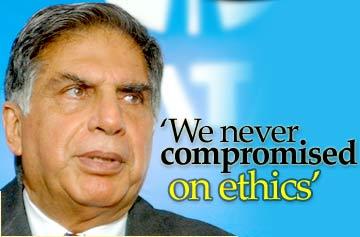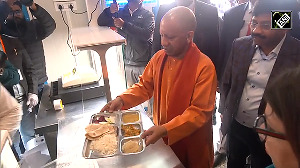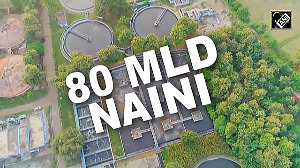
Getting a diverse group of 80 companies into shape is never easy, and two years after stepping down as Executive Chairman Ratan Tata evaluates the group's performance and finds that while it is still a bit resistant to change, the top firms are doing well, and international operations are in much better shape, with new overseas acquisitions on the projected growth path.
Excerpts from the first part of a two-part interview with T N Ninan and Palakunnathu G Mathai.
Looking back at what's happened in the last decade and more, how much of what you expected to achieve have you been able to accomplish so far?
This is somewhat difficult to respond to because some of what one wanted to do changed with the times and market conditions. On a scale of 10, it would probably be a six or seven -- that's the kind of intuitive feel I have of where we are.
What stands out in that?
One is certainly the greater integration of the group and that has added an enormous strength to what we've done because we really were a disparate group of companies.
The second is the greater alignment, which is also part of the integration, an ability to integrate and converge on goals. The other has been the unified corporate visibility in terms of logos and signage.
Then we set some goals on sales and profits which we didn't meet per se in the time frame because we went through those three years of an economic downturn.
We were off by a year. All the companies, the major ones, are economic value added (EVA) positive today which has never happened before.
So you don't have any negative EVA now?
We don't have any negative EVA now in the major 12-13 companies. Two years ago, we set ourselves the goal of going international. Things are coming together.
We haven't achieved as much on the portfolio restructuring side as we had hoped we would do. And on that front there have been more human problems than anything else. The shortfall has been much more in the area of taking the 80 companies and bringing them down to 30 or 40 in 10 or 12 different businesses.
Where do you see the return on capital employed, return on net worth, those kind of numbers, for the group?
Because we are using EVA, we're certainly better than the cost of money. For the top 12 companies, the return on net worth has risen from 16.7 per cent in 1994-95 to 26.6 per cent in 2003-04.
You weren't very keen on steel as an industry at one point. Has that changed?
No, that's not true. When McKinsey was involved, it was very negative on steel. I've always held a view that steel provided a return that was below the cost of money.
So I felt that we couldn't even think of exiting Tata Steel and that Tata Steel needed to look at another line of business that gave it a better return, that is, a second line of business, not in lieu of steel.
That has changed now. Per capita consumption of steel in India is so low that in India the steel business is going to grow and it's not a sunset business. But the returns have to be better.
Tata Steel has done a lot on cost cutting and so on. There's no doubt that the market and the prices have catapulted the steel industry into something totally different from what it was four years ago.
Do you feel that the group's traditional emphasis on doing business a certain kind of way, which was sometimes used as an argument for saying that we won't get the kind of numbers that other people get, is still a constraint?
You mean in terms of ethics and values? Yes, it's still a constraint. But we're very heartened that we've not compromised on those and have grown the way we have. Our topline has grown more than four times (to Rs 61,434 crore) from (what it was in) 1991 (Rs 13,290 crore).
Has the group been re-assessed by the public, because there are changes in rankings in surveys that people do on the most admired CEO, the most respected companies and so on?
First, I don't give too much weightage to that because you're the dog when you're doing badly. If Tata Motors is in a loss, we say, look the market shrunk but our market share didn't shrink. But nobody listens to you.
Suddenly when the market booms again, the same company under the same management producing the same products just goes through the roof and everybody calls it a turnaround.
Nobody wanted to listen to you and understand you. So I don't pay much credence to these. Part of it is also the fact that the group is more integrated today than what it was before.
Are you ready for another downturn, should it come? And since the more likely scenario is rapid growth -- how do you see yourself in that context?
One of the major drivers of going international is to get out of the clutches of the single economy and to have the ability to spread yourself over greater geographies which are presumably not aligned in the same economic cycle.
We feel that this broader base is going to equip us better against a downturn. And we have, through that last downturn, taken off a lot of fat and a lot of cost out of many of our companies and we're better equipped to deal with a downturn than we were at that time.
And still be EVA positive?
Certainly we try to be. When there is a downturn, margins will fall but so long as you can cover your overheads and run full up as they did in the last downturn, Tata Steel will continue to be okay. A product company like Tata Motors will face initial change in product pricing but its product offering is more robust and more secure.
I've just come back from South Africa where the Indica has, in the first three months of launch, exceeded any other vehicle launch in South Africa. We are looking forward to selling 10,000 a year.
The two most successful product launches have been the Renault and Kia, but we've exceeded them in the first three months. I find it very heartening that people in South Africa are saying, "Oh, you're connected with the car?"
Other than the restructuring, what else is there that makes you give what you expected to achieve a six out of 10 and not a higher figure?
I don't think restructuring is unfinished, because it's going to be a continuous thing. In answer to your question, we are less risk averse than we were and we're less conservative, but we're still resistant to change and that's a human issue.
It reflects, perhaps, in the fact that we still have more traditional incumbents in our companies who are afraid of change and it reflects on our HR policy which doesn't adequately allow for mistakes to be made.
Looking forward, can you go into the details of the internationalisation issue you referred to?
Internationalisation will take two forms. One is the growth of our own companies abroad. The second is the important change we mandated 10 years ago which is, please don't look at organic growth alone but look at acquisitions as a means to grow.
Our willingness to look at companies that we can acquire has been another wave of international growth. In that we have tried to be different.
We have tried very hard and quite successfully to let some of the major acquisitions we have made -- be it Tetley, Daewoo and now Hispano -- be themselves with the face, touch and feel of a local company, just owned by an Indian company.
At the same time we have been able to integrate product plans and strategies. So Tetley has the same management as it had when we acquired it. Daewoo has the same management.
I intervened in Tata Motors when it was going to send 14-16 people to Korea and said, don't do that. Put one finance person and one integration person there to integrate the two operations. Don't just bombard the organisation with Indians and give everyone a feeling that this is an Indian takeover.
The same is true of Hispano where we have put just one or two people there. And it seems to work well because those people continue to have their visibility and in each case there's a great sense of belonging to the family.
Are the companies doing well after you took over?
Both Tetley and Daewoo are doing much better than they were doing before. Even VSNL is doing better. Though we lost the main business, we set ourselves the task of identifying a new line of business.
We looked at broadband as the way to go. We invested, I think very boldly, in undersea cable capacity, first on our own and then made a somewhat gutsy move to acquire Tyco's entire network.
We've now got the second network operator in South Africa. So we will actually be the VSNL of all of South Africa, including in fixed line. We will shortly be allowed to apply for a licence for cellular services.
We will be the second network operator, we'll be one of six or seven cellular operators, but we will be probably amongst the larger telephone providers with a network. Certainly in the data area we will be the largest.
As a group going into other markets, into these other cultures -- does it function smoothly?
We've really not had too much of a problem. Korea perhaps has been one that's been culturally the most different. We've had surprisingly little trouble. We were welcomed in a very heartening manner, oddly enough for reasons unwarranted for us because we're the Tatas.
We were welcomed in Korea against the Americans because of the Buddhist connections. The first day I had lunch with the workers in the canteen through interpreters. This was the common thread, as against the company going to a US or Christian company.
But in South Africa and Bangladesh, where we weren't expecting an Indian company to receive a great deal, we've received a good response.
So there have been no adjustment issues?
Somehow an Indian company comes across as being neutral. If we can continue to not do the typical American style takeover deal and pepper the company with our executives and our systems [we'll be fine].
It takes a little more time to do due diligence on the company and make sure that the chemistry is right and the people are converted. Once you've done that, what you want to do is to basically leave that company alone.
In the case of Daewoo, we had 26 per cent of their market share in Korea and we got the use of the Daewoo name, too. The market share is now 33 per cent or so.
Do you have a team that's on the look out for acquisitions or is it just tactical, opportunistic?
We look for them. We don't have a big M&A group -- we have one centre and the person who's focused on this is Arun Gandhi, who we brought on to the board of Tata Sons. He's been focused on mergers and acquisitions for many years and has been a very useful and worthwhile addition because he's been in the Tyco deal.
What percentage of business now is overseas, including exports from here, and where do you see that in five years?
A little more than 20 per cent.
And in five years?
Assuming that India has a promising future, I would see more than 30-35 per cent coming from overseas. I really don't want to see us 60:40.
Part II: 'Rs 1-lakh car will not be motorcycle on 4 wheels'
Design: Rahil Shaikh
Photo: Sebastian D'Souza/AFP/Getty Images







 © 2025
© 2025